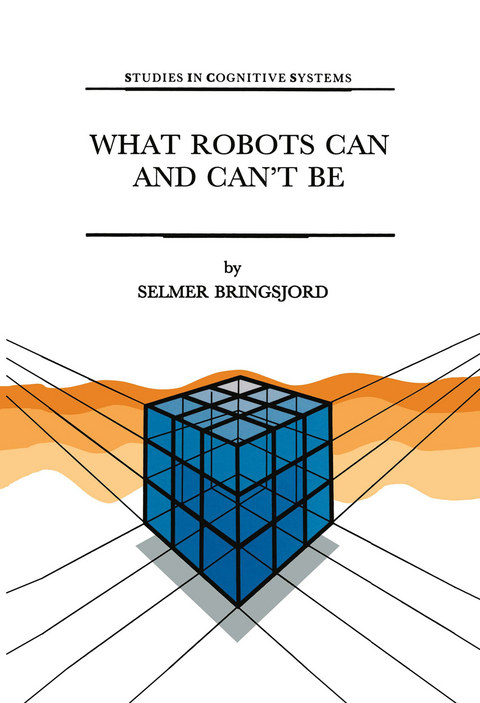
What Robots Can and Can’t Be
Springer (Verlag)
978-0-7923-1662-6 (ISBN)
ments be thrown to the wind - in light of the fact that careful, precise, step-by-step deductive arguments will be presented below for each and every proposition that might be cavalierly regarded prima facie implausible. Key Theses So, to put it colloquially, I think we're headed toward real izing Blade Runner, a classic sci fi movie in which only an elaborate pupil-scanner (which detects the usual physiolog ical correlate to an emotional response to provocative ques tions) enables one to distinguish androids from humans. And Blade Runner turned real, it seems to me, will be the Age of The Philosopher. Qualia Scanner Pupils undilated! Why? Well, to start, this will be an era within which the so-called "problem of other minds" will be especially pointed, because the sort of question frequently posed by in structors in introductory philosophy courses, namely How do you know, really know, that the person next to you isn't just a robot, that underneath her "skull" hums a complicated silicon device instead of a flesh-and-blood human brain? WHAT ROBOTS CANANDCAN'TBE 4 will be a deadly serious one.
I: Introduction.- What This Book Is.- Key Theses.- A Note on Ad Hominem Attacks.- Who’s My Audience.- On Doing Philosophy.- Other Arguments Against Theses Like (PERAUT).- The General Plan.- The Cluster Approach.- Connectionism and the Arguments Herein.- What Isn’t In This Book.- Appendix 1I: Argument from Alvin Formalized.- Appendix 2I: Key Theses Mentioned Thus Far.- II: Our Machinery.- Relevant Automata and Their Relevant Properties.- Theses To Which These Considerations Give Rise.- Brief Remarks on Uncomputability.- Pre-Philosophical Data; Ontology.- The Deductive Machinery.- III: Arguments Pro, Destroyed.- The Argument From Analogy.- The Argument From What Should Remain Unexplained.- The Argument From Natural Functions.- Pollock’s Person-Building Arguments.- Cole’s Case for Person Building.- IV: What Robots Can Be.- Sherlock Holmes and Expert Systems.- Computer-Generated Fiction.- V: Searle.- The Argument From Jonah.- Three Objections to the Jonah Argument.- VI: Arbitrary Realization.- First Version of ARA.- Second Version of ARA.- Maudlin’s Olympia Attack.- VII: Gödel.- The Gödelian Argument (Informal).- Weak Objections That Nonetheless Refine the Gödelian Argument.- New Version of Gödelian Argument (Informal).- The Real Problem with the Gödelian Argument.- Is the Gödelian Argument Dead, Then?.- VIII: Free Will.- Determinism and Indeterminism.- Other Concepts; the “Dilemma”.- The Main Argument, for Real.- Iterative Agent Causation.- Main Argument’s Premises Defended.- Objections.- Conclusion.- IX: Introspection.- The Argument from Incorrigibilism.- X: Conclusion.- Index of Illustrations.- Index of Names.- Index of Subjects.
| Erscheint lt. Verlag | 30.4.1992 |
|---|---|
| Reihe/Serie | Studies in Cognitive Systems ; 12 |
| Zusatzinfo | XIV, 381 p. |
| Verlagsort | Dordrecht |
| Sprache | englisch |
| Maße | 152 x 229 mm |
| Themenwelt | Geisteswissenschaften ► Philosophie ► Logik |
| Informatik ► Theorie / Studium ► Künstliche Intelligenz / Robotik | |
| Sozialwissenschaften ► Soziologie ► Spezielle Soziologien | |
| ISBN-10 | 0-7923-1662-2 / 0792316622 |
| ISBN-13 | 978-0-7923-1662-6 / 9780792316626 |
| Zustand | Neuware |
| Haben Sie eine Frage zum Produkt? |
aus dem Bereich


